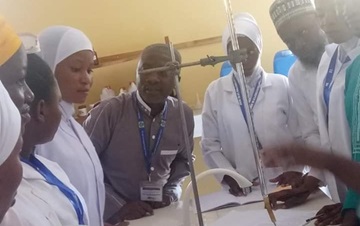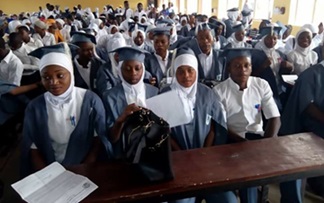Contact
Kwara State College of Health Tech.,
Ojoku Road, P. M. B. 430, Offa.
+234-81-8444-6632
contact@offahealthtech.edu.ng
correspondence@offahealthtech.edu.ng
Gallery






NEW PROGRAMS
BIOMEDICAL ENGINEERING
A. RATIONAL
The Professional Programmes in Biomedical Engineering is designed to expose students to broad areas of the basic Biological, Medical, Physical, and Engineering Sciences in addition to applied Biomaterials, Biomedical, Devices. Moreover, the inter-disciplinary nature of the programme positions the graduate to be versatile, self-reliant, with the required entrepreneurial skill to be self independent in the business world.
Biomedical Engineering combines the technologies of Biological and Medical Engineering and so concerned with the theory, design and production of biomedical systems, components and devices used in the three levels of health prevention, treatment and rehabilitation. The major objective of our professional programmes is produce graduates with an in-depth knowledge of both the practical and theoretical aspects of Biomedical Engineering with its. Technology that is broad enough to permit self-employment after graduation. We also hope to produce graduates that will take us employment within and outside the country in the broad field on biomedical engineering.
The course is designed to expose students to all of the major areas of Biomedical Engineering through series of lectures, laboratory exercise and tutorials. During the programme, the students are given the opportunity to develop more specialized understanding through an extended research project as well as some interval of industrial attachment as important component of the programme.
The scope of the programme is so wide that it is impossible for a graduate of the programme to be a specialist in all the branches of the fields. As result the programme has been delineated into a number of specialty areas which are called options in the instance.
B. ADMISSION REQUIREMENTS
Five ‘O’ Level Credit passes at WASSC/NECO which include English Language, Mathematics, Chemistry, Physics and Biology. The Department admits students through these routes.
C. PROGRAMME STRUCTURE
The programme structure includes period of formal studies in the College (2 years), Projects, vival and Industrial Training (1 year). Total 3 years.
Industrial Training is observed for 2 months after each session in the first and second year before going at a stretch for 1 year
X-RAY TECHNICIAN
A. RATIONAL
This programme is designed to provide X-Ray technicians with the knowledge and skills in assisting the radiographer and also production and processing of Radiographic Image. They provide trained staff for assisting in all aspect of Radiography. Duties may include assist in research programs involving basic epidemiological and clinical studies. It also ensure high standard of ethical and moral responsibility to Radiography profession and the public they serve.
B. ADMISSION REQUIREMENTS
Application with the following qualification may be considered for the X-Ray Technicians Programme.
Five (5) ‘O’ Level Credit passes at WASSC/NECO which include English Language, Mathematics, Chemistry, Physics and Biology. The Five (5) ‘O’ Level credit are to be obtained at no more than two sitting. The recoginezed examination bodies are:
C. PROGRAMME STRUCTURE
The duration shall be a three (3) academic session which is equivalent to six (6) academic semesters including supervised clinical work experience.
PROSTHETICS AND ORTHOTICS TECHNOLOGY
A. RATIONAL
Prosthetics and Orthotics Technology discipline is commonly categorized as an Allied Health Science course or Paramedical Science course being offered as a professional course in College of Health and University.
Among people Prosthetics and Orthotics is more commonly known by terms like Artificial Limbs; Bionic Limbs; Calipers, Braces, & Splints; Supportive &Ambulatory Devices; Assistive Device & Technology; medical and therapeutic footwear.
On completion of this programme, the diplomate will be able to assist in assembling and fitting of Orthopacdic appliances in conformity with the prescription of the physican. The programe is also designed to identify component part of orthopaedic appliances and interpret specification for orthopaedic appliances.
B. ADMISSION REQUIREMENTS
Minimum of four ‘O’ Level Credit at GCE, WASC or NECO in the following subjects at NOT more than two sitting.
1 credit in Biology or Health Science
1 credit in passes Chemistry, Physics or Technical Drawing
2 credit in any other subjects.
At least passes in English Language and Mathematics are compulsory.
C. PROGRAMME STRUCTURE
The National Diploma (ND) programme is terminal. The programme is of two (2) years duration of four (4) semesters of 15weeks each and total of 1800 contact hours.
The training programme consists of ND-two year in the institution (College) and one year compulsory supervised clinical attachment. This qualifies the diplomate as Prosthetics and Orthotics Technology registarble with the professional body.
OPHTHALMIC TECHNICIAN
RATIONALE
Ophthalmic Technicians are Health professionals who are in integral part of the medical practioners providing vision care. They perform administrative and clinical functions, by coordinating clinic schedules, carting, coding and transmitting orders of the physician. Duties may include calibrating and maintaining ophthalmic equipment’s and supplies, recording medical histories, vision testing, eye movements and binocular functions, measuring optical power and visual fluids, assisting in minor and major eye surgery and performing ocular imaging and biometry services as applicable by local laws.
For admission into the three years (3) Professional Certificate in Ophthalmic Technician (OPT) Programme. Candidates must possess the followings:
Senior secondary school Certificate (SSSCE) WAEC/NECO with Credit Passes in Five (5) subjects including English Language, Mathematics, Physics, Chemistry, and Biology in not more than two sittings.
Three (3) years, Six (6) semesters of Theoretical and field practical sessions